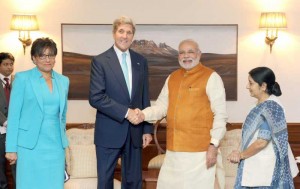
US Secretary of State John Kerry discussed bilateral issues with Prime Minister Narendra Modi in a prelude to the summit meeting between US President Barack Obama and Modi in Washington in September.
Kerry’s 40-minute long meeting with Modi at the Prime Minister’s House, 7, Race Course Road, comes a day after he met External Affairs Minister Sushma Swaraj for the 5th India-US Strategic Dialogue.
They discussed bilateral issues and strategic relations between the two countries.
Kerry said the US was keen to partner the Modi government in its vision of “Sabka saath sabka vikas” or cooperation of all, development for all, met Modi at 11 a.m.
Kerry arrived in Delhi at the head of high-level delegation, in the first high-level contact of the US with the Modi government.
During the Kerry-Sushma meeting, India raised the issue of America’s cyber snooping and termed it unacceptable between friends.
Addressing a joint press briefing after their nearly four-hour long talks, Sushma Swaraj said she had conveyed to Kerry that the people of India were very agitated over the US surveillance activities.
Kerry, in his reply, said that the US “fully respects and understands the feelings expressed” by the minister and that the US would continue to work with India wherever they saw a threat to their shared interests.
Aiming for a re-energised India-US bilateral relationship, External Affairs Minister Sushma Swaraj and Kerry explored frontiers vis-a-vis security and clean energy during the fifth India-US strategic dialogue here.
“The two sides recognised that the decisive mandate provided by the Indian people to their new government provided a unique opportunity to re-energise this relationship,” said a joint statement on the strategic dialogue.
Sushma Swaraj and Kerry hoped that the Summit Meeting between Modi and US President Barack Obama in Washington in September would generate new dynamism in the relationship.
The two leaders said they were committed to intensify efforts to combat terrorism.
“Sushma Swaraj and Kerry committed to intensify efforts to combat terrorism, proliferation of WMDs (weapons of mass destruction), nuclear terrorism, cross-border crime, and address the misuse of the internet for terrorist purposes, in compliance with respective laws,” the statement said.
Sushma Swaraj and Kerry welcomed the continuation of the Counter-Terrorism Joint Working Group process, sustained exchanges of senior experts, and the upcoming meeting of the Working Group in 2014.
They also welcomed plans to hold the next Ministerial Homeland Security Dialogue.
The two leaders also agreed to work towards greater cooperation in cyber security and reducing cyber crime.
In the area of energy, Sushma Swaraj and Kerry welcomed work under the Partnership to Advance Clean Energy (PACE) in its Research and Deployment components.
They reviewed the new initiative on Promoting Energy Access through Clean Energy (PEACE) in giving Indian citizens in rural areas access to off-grid sources of clean energy.
The two leaders reaffirmed their commitment to the full implementation of the India-US civil nuclear agreement.
“They looked forward to advancing the government-to-government dialogue and facilitating the establishment of US-built nuclear power plants in India,” the statement said.
The two sides also identified education and skill development as important areas of future cooperation.
“They called for partnerships between Indian and US testing services institutions to improve nationwide student assessments in India,” the statement added.
On the issue of stability in Afghanistan, Sushma Swaraj and Kerry reaffirmed their support for a unified, independent and sovereign Afghanistan.
“They expressed admiration for the determination of the Afghan people to exercise their democratic right to vote despite the significant threat from terrorist elements,” the statement said.
They welcomed the efforts of Afghan institutions involved in the current electoral process to work together with the UN to ensure the timely completion of the ongoing process, so that the elections are a source of unity and strength for the country and a source of stability for the region.
The leaders reiterated their deep concern over the current situation in Iraq, which posed a direct threat to the security of the people and the territorial integrity of the country.
“They affirmed that they attached the highest priority to the security and safety of their respective nationals in Iraq. They stood by the people of Iraq in their fight against international terrorism and their efforts to preserve Iraq’s unity and territorial integrity, recognising that a stable, peaceful, united and democratic Iraq is in the interest of regional and global peace and security,” the statement said.